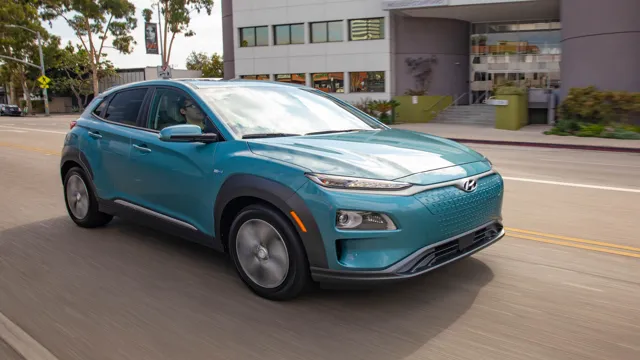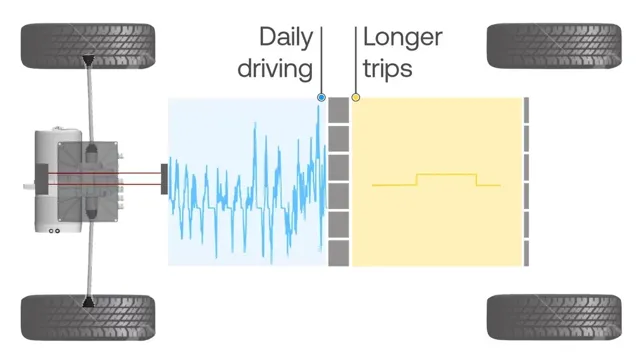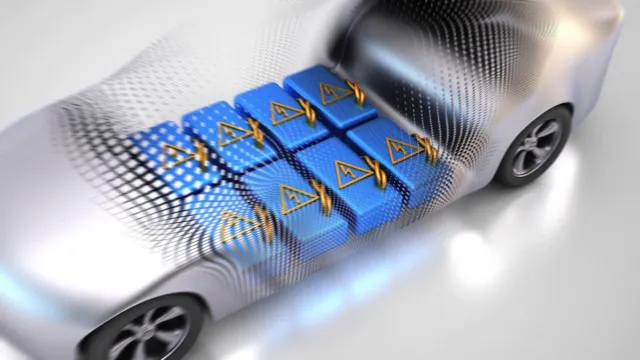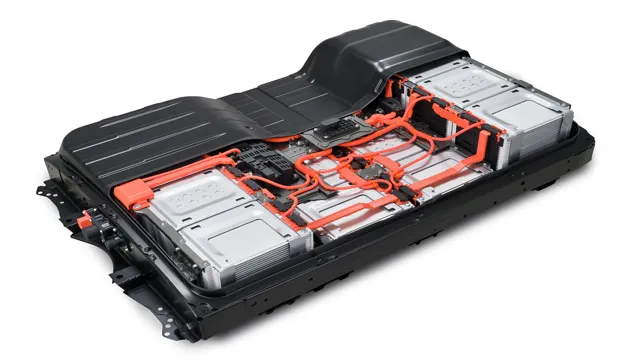Revolutionizing the Drive: Exploring the Performance and Battery Range of Electric Cars
Electric cars are a promising alternative to traditional gasoline-powered vehicles. They offer many benefits, including lower maintenance costs, reduced environmental impact, and the potential for long-term cost savings. However, one significant concern for electric car owners is the limited range of their vehicles.
Maximizing battery range is crucial to ensure a stress-free and enjoyable driving experience. It can also alleviate any concerns about running out of power while on the road. In this blog post, we’ll explore tips and tricks for maximizing battery range so that electric car owners can enjoy the many benefits of their eco-friendly vehicle without any worries.
Let’s delve into the details!
Factors That Affect Battery Range
When it comes to electric cars, battery range is a major concern for drivers. But what factors affect the battery range of an electric car? One of the biggest factors is temperature – extreme hot or cold weather can cause the battery to lose charge more quickly. Similarly, the speed at which you’re driving can impact battery range as well, with higher speeds using up more energy.
Another factor is the weight of the vehicle – carrying heavy loads can decrease battery range. Finally, using certain features like air conditioning or heated seats can also drain the battery more quickly. It’s important for electric car drivers to be mindful of these factors and make adjustments as necessary to optimize their battery range.
Temperature
Temperature When it comes to electric vehicles, temperature can have a significant impact on battery range. Extreme hot or cold temperatures can cause battery degradation and reduce overall range. This is because batteries operate optimally within a specific temperature range, typically between 20-25°C.
When it’s too hot, the battery pack can experience thermal runaway, which can cause permanent damage to the cells. On the other end of the spectrum, extremely cold temperatures can cause the battery’s chemical reactions to slow down, reducing overall performance. Luckily, many EVs come equipped with temperature management systems that help regulate the battery’s temperature and minimize the impact on range.
But it’s still important to keep in mind that temperature can have a significant impact on how far an electric vehicle can travel on a single charge. So when planning a road trip or daily commute, be sure to take into account the temperature and adjust your expectations accordingly.

Driving Behavior
Driving behavior has a significant impact on the battery range of your electric car. The way you drive, the terrain you’re driving on, and the weather conditions you’re facing can all affect the distance your car can travel on a single charge. For instance, frequent acceleration and hard braking will drain the battery faster, leading to decreased range.
Similarly, driving uphill or on rough terrain requires more power, which will consume the battery faster. Moreover, extreme temperatures can also significantly affect battery range. In cold weather, the battery’s performance can decrease by up to 40%, while in hot conditions, the battery can struggle to cool down, leading to a decrease in range.
Therefore, it’s important to adopt efficient driving habits, avoid aggressive accelerating and braking, stick to the recommended speed limit, and drive smoothly. By doing so, you can maximize your battery’s range and enjoy a longer, more comfortable ride.
Vehicle Size and Weight
When it comes to electric vehicles, the size and weight of the vehicle can have a significant impact on the battery range. Generally, larger and heavier vehicles require more power to move, which can drain their batteries quickly. In addition, factors such as wind resistance and terrain can also affect battery range.
For example, if you’re driving on a hilly road or in strong winds, you may notice that your EV’s battery life decreases more quickly than it would on a flat, calm road. However, advancements in battery technology have improved the range of electric vehicles in recent years, making larger and heavier EVs more viable options for longer trips. So, while vehicle size and weight should be considered when choosing an electric vehicle, it’s important to keep in mind that technological advancements are helping to overcome some of these challenges.
Current Range Options on the Market
When it comes to battery range options for electric cars, there are quite a few different options on the market today. With ranges spanning from as little as 70 miles on the low end to over 300 miles on the high end, there’s a wide variety of options available depending on your needs and preferences. If you’re mostly commuting within a city or suburban area, a lower range option may suffice, while those who frequently travel longer distances may want to opt for a higher range vehicle.
It’s important to consider factors like charging infrastructure, your typical daily driving habits, and the availability of charging options in your area when deciding on the best battery range for your needs. Ultimately, the right choice will depend on your individual situation and priorities.
Tesla Model S Long Range: 373 miles
When it comes to electric vehicles, range anxiety is a common concern for many drivers. However, with current advancements in battery technology, several vehicles on the market are capable of traveling long distances on a single charge. The Tesla Model S Long Range, for instance, boasts an impressive range of 373 miles, making it one of the top performers in terms of range.
Other EVs with comparable ranges include the Porsche Taycan and the Lucid Air. While a longer range does come at a premium, it can be worth it for those who frequently take long trips or live in areas with limited charging infrastructure. Ultimately, the range of an electric vehicle is a crucial factor to consider when making a purchase, and it’s important to weigh up your needs against your budget to determine the best range option for you.
Ford Mustang Mach-E: 270 miles
When it comes to electric vehicles, range anxiety is a real concern. But with the latest advancements in EV technology, we’re seeing some impressive numbers in terms of how far these vehicles can go on a single charge. One standout in this regard is the Ford Mustang Mach-E, which boasts a range of up to 270 miles.
That’s a significant leap forward from EVs of the past, and it’s one of the reasons why the Mach-E is generating so much buzz among consumers. Of course, the Mustang Mach-E is just one of many EVs on the market today, and there are plenty of other options to consider if you’re in the market for an electric ride. From the Tesla Model S to the Chevy Bolt, there’s a range of cars to choose from depending on your specific needs and preferences.
Whatever your choice, you can rest assured that EVs are only going to become more efficient and powerful in the years to come, meaning that range anxiety will soon be a thing of the past.
Chevrolet Bolt EV: 259 miles
The current market offers several options for electric vehicles with impressive ranges. One of the leaders in this category is the Chevrolet Bolt EV, which boasts a range of 259 miles. This vehicle has made great strides in the EV market, offering a practical choice for those looking to switch to a more sustainable option without sacrificing comfort or range.
The Bolt EV has a sleek design and plenty of cargo space, making it a versatile choice for anyone who needs both power and practicality. With charging infrastructure rapidly increasing across the country, owning an electric car like the Bolt EV is becoming more feasible for those with longer commutes or travel plans. The possibilities for sustainable transportation are growing, and the Chevrolet Bolt EV is leading the way.
Ways to Extend Battery Range
If you’re looking to get the most out of your electric car, extending your battery range is key. There are several ways to accomplish this, including optimizing your driving habits and ensuring your car is properly maintained. One of the most effective ways to increase battery range is to minimize your use of the car’s HVAC system, as this can put a strain on the battery.
Another strategy is to use regenerative braking whenever possible, as this captures energy that would otherwise be lost and uses it to recharge the battery. Additionally, making sure the tires are properly inflated can reduce rolling resistance, making it easier for the car to move and ultimately extending the battery range. By incorporating these tactics into your driving routine, you can significantly increase the distance you can travel on a single charge, allowing you to enjoy all the benefits of electric car ownership.
Efficient Driving Techniques
When it comes to maximizing the battery range of your electric vehicle, efficient driving techniques are essential. One way to achieve this is by practicing regenerative braking, which can extend battery life by using the energy generated during braking to recharge the battery. Additionally, avoiding sudden accelerations and maintaining a moderate speed can help optimize energy usage and increase your EV’s range.
Another simple yet effective technique is to reduce the use of energy-consuming features such as air conditioning or high-powered stereo systems. By implementing these strategies, you can significantly improve the efficiency of your driving and get the most out of your EV’s battery.
Regenerative Braking
Regenerative braking is an innovative technology used in electric vehicles to help extend battery range. It works by converting the kinetic energy produced during braking back into electrical energy, which is then sent back to the battery to be used later. This is accomplished by using the electric motor as a generator, which slows the vehicle down and converts its energy into electricity.
By doing this, regenerative braking can increase the energy efficiency of electric vehicles by up to 30%, which can significantly extend battery range. This technology not only helps reduce the cost of energy consumption but is also environmentally friendly, making it a win-win for both the driver and the planet. So, by using regenerative braking, electric vehicles can travel further, use less energy, and emit fewer harmful emissions.
Charging Strategies
As electric vehicles become more prevalent, maximizing battery range is crucial for drivers. One way to extend battery range is by utilizing charging strategies. For example, scheduling charging during off-peak hours or when renewable energy sources are most available can reduce the cost of charging and promote sustainable energy usage.
Additionally, gradually charging the battery instead of fast-charging can improve the battery’s overall lifespan. Furthermore, pre-conditioning the vehicle’s cabin temperature while charging can reduce the battery’s energy usage during driving. It’s important to consider these strategies when planning long trips or daily commutes to ensure the best possible battery range.
By taking advantage of charging strategies, electric vehicle drivers can extend their battery range and make the most out of their vehicle.
The Future of Battery Range for Electric Cars
It’s no secret that one of the biggest concerns surrounding electric cars is their battery range. However, with advancements in technology and engineering, the future is looking brighter than ever for electric vehicles. Some experts predict that by 2025, electric cars will have a range of up to 500 miles on a single charge.
This would greatly reduce so-called “range anxiety” and make electric cars a more attractive option for long-distance travel. In fact, Tesla has already released a model with a range of over 400 miles. Of course, there are still challenges to be overcome, such as charging infrastructure and cost.
But as battery technology continues to evolve, it seems likely that electric cars will become an increasingly viable and practical option for consumers. So, don’t be surprised if you start seeing more and more electric vehicles on the road in the coming years!
Conclusion
In conclusion, the battery range of electric cars is a hot topic in the automotive industry. While some may argue that the limited range is a drawback, others see it as an opportunity for innovation and exploration. After all, who wants to drive for hours on end without a break anyways? With advancements in technology and an increasing focus on sustainability, it’s only a matter of time before electric cars become the norm.
So, instead of worrying about the battery range, let’s embrace the thrill of the ride and enjoy the journey – no matter how far we can go on a single charge.”
FAQs
What is the average battery range of electric cars?
The average battery range of electric cars is around 150-200 miles on a single charge.
How does the battery range of electric cars compare to gas-powered cars?
Generally, the battery range of electric cars is lower than that of gas-powered cars. However, advancements in electric car technology have increased the range in recent years.
Can the battery range of electric cars be improved?
Yes, the battery range of electric cars can be improved through advancements in technology and by using more efficient batteries.
How does driving style affect the battery range of electric cars?
Aggressive driving with quick acceleration and braking can significantly reduce the battery range of electric cars, while smooth and steady driving can improve it.





